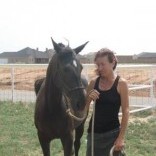
Fiction
Dariel Suarez is a Cuban-born writer who came to the United States in 1997. He earned his M.F.A. in fiction at Boston University, where he was a Global Fellow. Dariel is a fiction co-editor at Blood…
Read more »

Creative Nonfiction
Margaret Adams is a Maine-born writer and registered nurse living in Baltimore, Maryland. A former columnist for The Bangor Daily News and a Pushcart Prize nominee, her work has most recently appeared…
Read more »

Dreamscape #2: Dear Pinocchio
Creative Nonfiction
Jami Nakamura Lin received her MFA at the Pennyslvania State University. A Pushcart Prize nominee, her work has appeared or is forthcoming in Passages North, Monkeybicycle, r.kv.r.y, Escape Into Life,…
Read more »

Equine Character: A Meditation
Contest - 2nd Place
Jacqueline Kolosov is Professor of English at Texas Tech where she teaches in the graduate and undergraduate creative writing program. Her third poetry collection, Memory of Blue, is forthcoming from…
Read more »

Poetry
Bob Haynes lives in Scottsdale, Arizona, where he teaches at Arizona State University and online at Writers on the Net. Some of his poetry has appeared in North American Review, New Letters, Nimrod,…
Read more »

Poetry
Linda Parsons Marion is an editor at the University of Tennessee and the author of three poetry collections, most recently, Bound. She served as poetry editor of Now & Then magazine for many years…
Read more »

Creative Nonfiction
Michele Morano is the author of the travel memoir, Grammar Lessons: Translating a Life in Spain. Her essays have appeared in anthologies and literary journals such as Best American Essays, The Fourth…
Read more »

Poetry
Victoria Bosch Murray’s poetry has appeared in American Poetry Journal, Booth, Field, Greensboro Review, Harvard Divinity Bulletin, Salamander, Tar River Poetry, The Potomac, and elsewhere. Her…
Read more »

Poetry
Lewis Turco is the inventor of the verse form called the “bluesanell,” and a contributor to the recently-published Garnet Poems: An Anthology of Connecticut Poetry Since 1776, edited by Dennis…
Read more »

Poetry
Maureen Alsop, PhD, is the author two full collections, Apparition Wren and Mantic, as well as several chapbook collections. Her poems have appeared in a variety of print and online publications…
Read more »

Fiction
Janice Greenwood’s writing has appeared in Cider Press Review, Cimarron Review, and New England Review. She was recently nominated for a Pushcart Prize. She received her BA from the University of…
Read more »

Poetry
Marjorie Stelmach’s most recent volume of poems is Bent upon Light (University of Tampa Press). Individual poems have recently appeared in Arts & Letters, The Cincinnati Review, Image, The Iowa…
Read more »

Creative Nonfiction
Micah Dean Hicks usually writes magical realism, southern fairy tales, and other kinds of magical stories. You can find his work in places like New Letters, Indiana Review, and New Orleans Review. His…
Read more »

Contest - 3rd Place
Alisha Karabinus is co-founder and Executive Editor of Revolution House magazine and an MFA candidate in Fiction at Purdue University, where she is also the Managing Editor of Sycamore Review. Her…
Read more »

Poetry
Author of three volumes of poetry, Leatha Kendrick leads workshops in poetry and life writing at the Carnegie Center for Literacy and Learning, a community literary center in Lexington, Kentucky.…
Read more »

Contest - 1st Place
Marcia Aldrich is the author of the free memoir Girl Rearing, published by W.W. Norton and part of the Barnes and Noble Discover New Writers Series. She has been the editor of Fourth Genre:…
Read more »

The First Moons of Sitting Bull
Fiction
Jesse Donaldson is a graduate of Kenyon College and The Michener Center for Writers. He's worked as a groundskeeper for the Houston Astros, a maintenance man, and a professor. His work has recently…
Read more »

Fiction
Robert Guthrie lives in Little Rock, AR with a pair of red-headed women. Aside from the story featured in this issue, his fiction has appeared most recently in Northwind and Cloud 9 magazines.
Read more »

The House With Only The Sound
of A Dog Barking Inside
Poetry
Dick Allen’s forthcoming eighth poetry collection, to be published by St. Augustine Press in Fall, 2013, is This Shadowy Place—winner of the 2013 New Criterion Poetry Prize. It’s his first…
Read more »

Understanding Dear Alice’s Dilemma
Poetry
Emari DiGiorgio makes a mean arugula quesadilla and has split-boarded the Tasman Glacier. She is Associate Professor of Writing at The Richard Stockton College of New Jersey and a NJ State…
Read more »
Victoria Bosch Murray
Birds abandon the trees in twos,
threes, tens or more at a time.
The windows beside the bed
are pallets, little Sistines, story boards
of consecutive action, force
and fault: first this
and then this: it is summer, and
then you wake to slanted
light, your sometime-lover
beside you sleeping. Or
awake? His hand, a lone
mosaic on your restless thigh,
a known thing: this I own.
You watch takeoff, the thrall of
symmetrical tessellation, this
beyond branches brown,
a burnt green harbinger
of fall, a consolation of
metaphor, these birds machine
and bike chain, peppercorn and
poppy seed, flung opium and
hope patterning a loose
mathematical certainty, or
the approximation of, something
calculable by someone else,
somewhere else.
Read more »




















